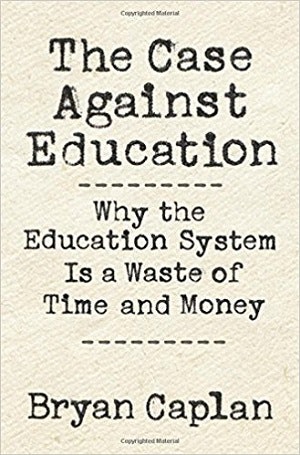In The Case Against Education, Dr. Bryan Caplan, a professor of economics at George Mason University and a senior research fellow at the Mercatus Center (which was funded in part by Charles Koch, who is a director there), pushes all the buttons sure to infuriate those on the left and the right.
Caplan’s case is simple enough. According to him, most education is just signaling — proving certain students can persist, conform, etc., and that most of what they learn is useless, including the humanities, social sciences, fine arts and even his own discipline of economics. When did you last use algebra or history, he continually asks.
The solution, according to him, is to end all publicly funded education at grade nine, when students achieve nominal literacy and numeracy, and allow the majority of 14-year-olds to enter the workforce and let the free market reign.
Let me be clear about my own biases. I have a Ph.D. in comparative literature and am a product of public schools — K-12 and post-secondary education institutions. I have worked exclusively at institutions of public higher education, in most cases at regional comprehensive universities that serve a wide array of “non-traditional” students. One was a Hispanic-serving institution, another a historically Black institution, and yet another was located in one of the poorest zip codes in the nation. I am currently at a public liberal arts institution that was once a women’s college.
If you ask me for my opinion, I would say that yes, there are some real problems with how we currently teach and with what we teach, but I would also say, public education can be fixed and is worth saving.
Caplan admits early on to being one of the out-of-touch professors with no real understanding of the “real world.” But then he spends a lot of time telling the reader how education as it currently stands doesn’t serve “the real world,” at least in gross economic terms. Of course, these economic terms are not as cut-and-dry as he asserts them to be, but Caplan doesn’t allow conflicting facts to get in the way of his central assertion, one that seems to come from his own dissatisfaction with his schooling.
Caplan begins his book with the lines: “Learning doesn’t have to be useful. Learning doesn’t have to be inspirational. When learning is neither useful nor inspirational, though, how can we call it anything but wasteful?” His definition of “useful” essentially is the direct transfer of skills acquired through education to a job. For Caplan, this means that only vocational education and certain “practical” degrees like engineering are worthwhile but only deserve minimal public support, if any.
 Dr. Lee Skallerup Bessette
Dr. Lee Skallerup BessetteNevertheless, let’s look for a moment at these “practical” programs. I distinctly remember my friends declaring, 20 years ago that very little of what they had learned in engineering school was really applicable to their jobs. Of course, over the past 20 years, there have been major moves toward integrated, project-based engineering and medical curriculum. But why does Caplan believe these kinds of changes aren’t possible in other arenas of public education?
Lost in Caplan’s argument is the idea of access. Who, in this 19th-century utopia of no public schooling beyond 14, will mostly benefit? If he is right to say that most educated people tend to replicate themselves, then how does getting rid of the current educational system benefit those who have historically been left out? The privileged will continue on to the elite private institutions that survive the defunding, which will no doubt offer scholarships to a few underprivileged students. His argument also neglects the research that shows that the changes made in engineering education actually benefit those most at risk of dropping out.
I haven’t used algebra, but I do use algebraic thinking. I might not remember the year the Civil War started, but I do know it was about slavery and humanity. I don’t use my understanding of supply and demand daily, but I can use my knowledge of it to think about the Civil War and how when people are reduced to economic agents alone, we can justify all kinds of inhumanity.
I certainly don’t believe we can or should dismiss all students as philistines as Caplan does, repeatedly, in his book.
Caplan is fond of using the analogy of an ineffective fungal cream in his book. If it didn’t work, he says, you wouldn’t keep spending money on it. Personally, I would go to a doctor.
As far as education is concerned, however, I am a citizen, a voter, a parent who can work with other citizens and voters to create a useful and inspirational system of education.
There is literally nothing I can do to fix the fungal cream. There is plenty I can do to fix education as a citizen.
Dr. Lee Skallerup Bessette is an instructional technology specialist at the Division of Teaching and Learning Technologies at the University of Mary Washington.


















